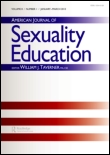Want to be on the cutting edge of research in sexuality education? Well, you can be! Your membership to the Sex Ed Network provides you with free, full access to the American Journal of Sexuality Education. In the full post, check out the editorials, research, commentaries, and lessons plans from Volume 9, Issue 1 of 2014. You don’t want to miss out! Join the Sex Ed Network TODAY, and save $100 on registration to the 2014 National Sex Ed Conference!!
Number 9, Number 9, Number 9… Introducing Volume 9 of the American Journal of Sexuality Education
William J. Taverner
Sneak Peek: “Ten years ago I received an exciting call from Steve Conley, then the executive director of the American Association of Sexuality Educators, Counselors, and Therapists (AASECT). The organization was the publisher and owner of the Journal of Sex Education and Therapy, which had been out of print for a
number of years. AASECT had made arrangements to transfer ownership of the journal to The Haworth
Press. They were going to put it back into print and they were looking for an editor. “Me?” I asked Steve, flattered and a bit overwhelmed at the idea of becoming a journal editor. I told Steve I would do it…”
But I’m Married: Understanding Relationship Status and College Students’ Sexual Behaviors
Sara B. Oswalt MPH, PhD & Tammy J. Wyatt PhD, CHES
Abstract: Sexual health programs on college campuses are often directed toward single individuals with a focus on sexual risk. Using a sample of college students, this study examines how relationship status relates to sexual behaviors and may be a factor for sexual risk. Based on the study’s results, expansion of sexual health programming on college campuses to include those married and in committed relationships is justified.
Sexuality Information Needs of Latino and African American Ninth Graders: A Content Analysis of Anonymous Questions
Francisca Angulo-Olaiz, Eva S. Goldfarb & Norman A. Constantine
Abstract: This study used qualitative content analysis to examine anonymous questions about sex and sexuality submitted by Latino and African American adolescents in Los Angeles, California, classrooms. The majority of questions asked about sexuality and sexual behavior, or anatomy and physiology, with fewer questions about pregnancy and pregnancy prevention, sexually transmitted infections, and condoms. Overall, a notable mix was found of questions implying exposure to or awareness of a wide range of sexual activities, together with questions demonstrating fundamental misunderstandings or confusion about some of the most basic aspects of sex and sexuality. Gender differences emerged across topics, subtopics, and question types. The results of this study suggest that differences exist between what Latino and African-American teens yearn to know about sex and sexuality, and what information they are getting on these topics from other sources. This reinforces the importance of considering the concerns and needs of the intended audience in designing and evaluating health education programs.
What Are They Thinking? Findings for Educators and Practitioners on Youths’ Experience and Knowledge of the HPV Vaccine
Susan Rakosi Rosenbloom & Caitlin Killian
Abstract: The Centers for Disease Control and Prevention (CDC) recommends the HPV vaccination for boys and girls starting at age 11, yet adoption rates are low. We use eight focus groups to explore the decision making process, experiences, and social influences, including media and sex education classes, shaping attitudes of male and female college students. We find many students who have misinformation or no knowledge of the vaccination yet are eager to learn more. Due to youths’ range of knowledge about the vaccination and varied preparedness for making their own medical decisions, practitioners are in a challenging position to inform and encourage responsible decision making without appearing coercive.
The State of Sexual Health Education in U.S. Medicine
S. Criniti, M. Andelloux, M. B. Woodland, O. C. Montgomery & S. Urdaneta Hartmann
Abstract: Although studies have shown that patients want to receive sexual health services from their physicians, doctors often lack the knowledge and skills to discuss sexual health with their patients. There is little consistency among medical schools and residency programs in the United States regarding comprehensiveness of education on sexual health. Sexuality education in U.S. medical schools and residency programs is reviewed, highlighting schools that go beyond the national requirements for sexuality education. Increasing the amount of sexuality instruction provided for medical education and training, standardizing sexuality education requirements in medical school and residency programs, incorporating different learning models, establishing means of consistently assessing and evaluating sexuality knowledge and skills, and creating national certification standards for the practice of sexual medicine are recommended.
The Core Competencies for Adolescent Sexual and Reproductive Health
John Elfers, Lidia Carlton, Paul Gibson, Maryjane Puffer, Sharla Smith & Kay Todd
Abstract: The Adolescent Sexual Health Work Group commissioned the development of core competencies that define the knowledge, skills, and attitudes necessary for all providers of adolescent sexual and reproductive health. This article describes the background and rationale for this set of competencies, the history and use of competencies, and the process involved in creating the core competencies. It explores the ways that educators can use them to strengthen classroom instruction and improve outcomes for adolescents in the area of reproductive health. Several additional tools that guide the application of the competencies to human resources, self-assessment, performance assessment, professional development, and program evaluation are described.
Considerations for Sexuality Education and Services for LGB Elders
Julie Chaya MA & Donna J. Bernert PhD LSHE
Abstract: Sexuality education and health services for elderly individuals who reside in care settings (e.g., assisted living facilities, nursing homes, retirement communities) have received limited attention in the professional literature. However, the lack of sexual health promotion practices in elder care facilities can be detrimental to older adults’ overall health and quality of life. Barriers to sexuality education services for lesbian, gay, and bisexual (LGB) elders are explored and include history of LGB equality in the United States and lack of social support, as well as discrimination among formal care facilities and health care professionals. The Community Readiness Model (CRM) is proposed for addressing these barriers. The purpose of the CRM is to assess readiness characteristics of a community before program implementation and then build capacity with programming in that community for support and education. Sexuality educators currently have the opportunity to develop and implement sexual health education and promotion resources that can potentially improve the quality of life for LGB individuals transitioning into the latter stages of the life course.
Teachers Working Cooperatively with Parents and Caregivers when Implementing LGBT Themes in the Elementary Classroom
Gabriel Flores EdD
Abstract: Many teachers are interested in having a more inclusive multicultural education that includes lesbian, gay, bisexual, and transgender (LGBT) themes and gay-themed children’s literature; unfortunately, research has found that many teachers do not implement gay themes in their multicultural education curriculum because of fear of criticism from parents and administrators, lack of professional training, and their own negative attitudes. Moreover, the most common topic that surfaces during teacher discussions are concerns over parental objections. This article will detail techniques and strategies when implementing LBGT themes and gay-themed children’s literature in the classroom and how to deal positively, cooperatively, and proactively with parents and caregivers.
The Components of Great Sex
Charles H. Wampold & Sarah E. Luebbert MED
Abstract: Ubiquitous “sex tips” in popular media evidence an unquenchable public interest in learning how to experience “great sex,” and studies confirm that a great sexual relationship correlates to general relationship satisfaction, which in turn correlates to overall happiness. While studies of great sex or “optimal sexuality” are few, enough is known to conclude that the paths to great sex depicted in popular media are largely dead ends. This lesson plan will help educators (a) dispel inaccurate information about optimal sexuality disseminated in the popular media and (b) inform students about the components of optimal sexuality.
Join the CFLE mailing list to stay on top of sex ed news and information:
Start out the New Year with some fresh ideas from the Sex Ed Store:
Follow us on twitter at: @SexEdNetwork









